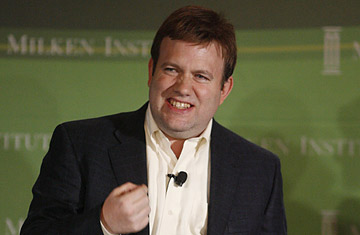
Frank Luntz speaks during a panel discussion at the 2009 Milken Institute Global Conference in Beverly Hills,California.
The Language of Health Care 2009
Frank Luntz; 28 pages
Download the PDF
The Gist:
Politicians in Washington often speak with their own vocabulary. If they're Republicans, Frank Luntz helped write their dictionary. The influential GOP pollster and language guru has had a hand in framing the party's message since 1994's Contract with America, persuading Republicans to drop terms like "estate tax" and "oil drilling" in favor of the far more message-friendly "death tax" and "energy exploration" among other rebrandings. His latest project: the health-care debate. Relying on polling and "instant response dial sessions," Luntz penned a 28-page memo, leaked to Politico, giving Republicans the soundbites designed to spin them to victory. (See five truths about health care in America.)
Highlight Reel:
Luntz Tip No. 1: Scare people. Especially about their children. Luntz's memo includes a road map to how to most effectively scare the bejeezus out of the American public when it comes to health care. Results show the phrase health care rationing frightened the most people, so Republicans are urged to sprinkle it around describing Democratic reform plans. It's also better to warn that Democrats want to put politicians in charge of health care, rather than bureaucrats: "Bureaucrats are scary — but at least they are professionals."
Finally, extra points for bringing voters' children into the conversation. "For the parents we talked to, the idea of waiting in line for the treatment they need — or being flat-out denied that treatment — was deeply worrying. But the idea that their children might not get life saving treatment in time? Unacceptable."
2. You, too, can be anti-corporate populists. Americans don't like the insurance industry, Luntz writes to Republicans, and neither should they: "We suggest ratcheting up the rhetoric against insurance companies to almost the same degree as you do against Washington bureaucracy." In fact, the whole discussion of health care as an economic issue should be scuttled — it should be framed as a personal, human issue at every opportunity. So less talk of consumers and free markets, more talk of patients and wellness. Besides, he points out, "in case you missed it, capitalism isn't exactly in vogue these days."
3. Choose the right words, and keep using them. As the Focus Group Shakespeare, Luntz's memo is packed with poll-driven, soundbite-friendly phrases to choose from. Expect to hear Republicans soon speaking earnestly of preserving "the sacred doctor-patient relationship" by never "putting politicians in charge of your health care." And not just any old politicians, but "federal bureaucrats, Washington lobbyists and out-of-touch politicians." Luntz even strings his creations together into mini-speeches on the topic, including phrases such as this soon-to-be C-SPAN classic: "We need targeted reform with measurable results that improves patient care — not a politicized, special interest-driven radical restructuring."
4. Leave Obama out of it. Though he doesn't say so directly, Luntz makes clear that the President's popularity is too much for the GOP to counter right now. So better to frame the health care fight as a battle between Republicans and Democrats, or, better still, Americans and politicians. "If you make this debate about Republicans vs. Obama, you lose."
The Lowdown:
As manipulative and synthetic as "The Language of Health Care 2009" often sounds, the bottom line is Luntz knows what he's doing. He's widely credited for helping Republicans seize and maintain control of Congress in the 1990s, and many Luntzisms continue to be staples of Washington rhetoric (just think of how often you hear about "tax relief"). Every American has a stake in the massive battle coming over health care reform, and voters would be wise to understand the weapons deployed to sway public opinion on both sides. However, how to craft smart reform and find common ground to get it done remain crucial questions, and on those Luntz's memo is silent.
Verdict: Read
